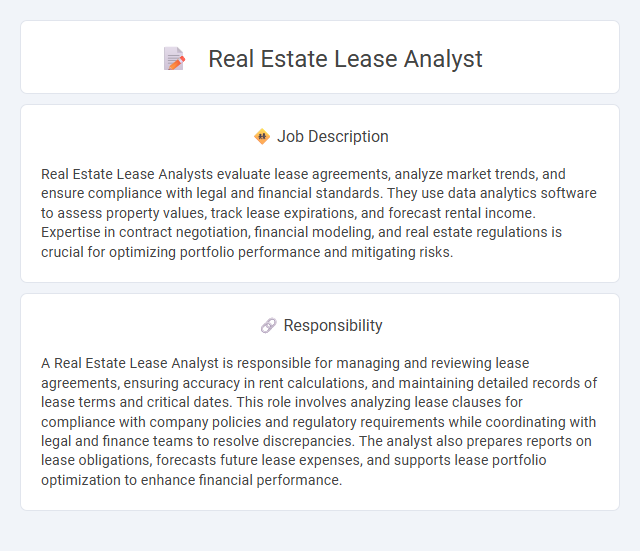
Real Estate Lease Analysts evaluate lease agreements, analyze market trends, and ensure compliance with legal and financial standards. They use data analytics software to assess property values, track lease expirations, and forecast rental income. Expertise in contract negotiation, financial modeling, and real estate regulations is crucial for optimizing portfolio performance and mitigating risks.
Candidates with strong analytical skills and attention to detail are likely suitable for a Real Estate Lease Analyst role, as the job demands thorough evaluation of lease agreements and market data. Individuals who thrive in environments requiring critical thinking and effective communication may find this position aligns well with their abilities. Those lacking interest in real estate or struggling with complex data interpretation may find the role less compatible with their strengths.
Qualification
A Real Estate Lease Analyst must possess strong analytical skills and experience with lease contract review, rent calculations, and market research. Proficiency in real estate software and financial modeling, along with knowledge of lease accounting standards such as ASC 842 or IFRS 16, is essential. A bachelor's degree in finance, real estate, or a related field, combined with attention to detail and strong communication skills, enhances effectiveness in this role.
Responsibility
A Real Estate Lease Analyst is responsible for managing and reviewing lease agreements, ensuring accuracy in rent calculations, and maintaining detailed records of lease terms and critical dates. This role involves analyzing lease clauses for compliance with company policies and regulatory requirements while coordinating with legal and finance teams to resolve discrepancies. The analyst also prepares reports on lease obligations, forecasts future lease expenses, and supports lease portfolio optimization to enhance financial performance.
Benefit
Real Estate Lease Analysts likely improve financial accuracy by meticulously reviewing lease agreements, which may lead to reduced expenses and minimized risks for the company. They probably enhance compliance with regulatory standards, potentially avoiding costly legal issues. The role often supports better decision-making through detailed data analysis, possibly increasing overall profitability.
Challenge
Real Estate Lease Analysts likely face the challenge of accurately interpreting complex lease agreements while ensuring compliance with evolving legal and financial regulations. The role probably requires meticulous attention to detail to identify potential risks and opportunities within lease contracts. Managing multiple leases simultaneously may increase the probability of encountering time-sensitive issues that demand swift and precise problem-solving.
Career Advancement
Real Estate Lease Analysts play a crucial role in managing lease agreements, ensuring compliance, and optimizing portfolio performance for real estate firms and corporate clients. Career advancement opportunities include progression to senior analyst positions, leasing manager roles, and eventually real estate portfolio management or asset management leadership. Expertise in lease administration software, financial analysis, and regulatory knowledge significantly enhances promotion prospects within commercial and corporate real estate sectors.
 kuljobs.com
kuljobs.com